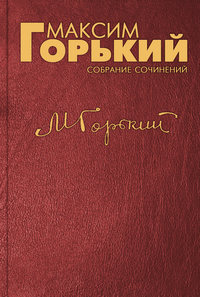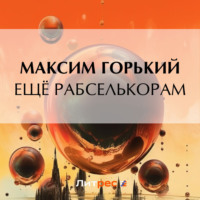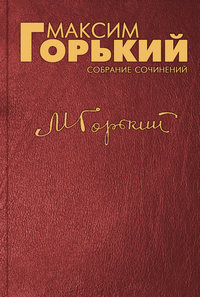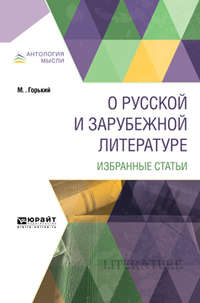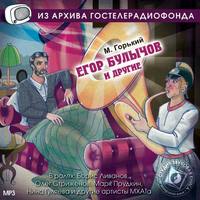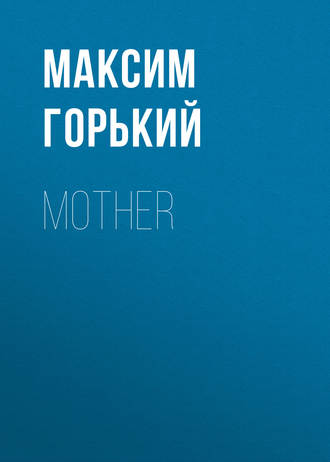 полная версия
полная версияMother
"Run, run!" whispered the mother, treading impatiently. Her ears were humming. Loud shouts were wafted to her. There on the wall appeared a third head. She clasped her hands in faintness. A light-haired head, without a beard, shook as if it wanted to tear itself away, but it suddenly disappeared behind the wall. The shouts came louder and louder, more and more boisterous. The wind scattered the thin trills of the whistles through the air. Mikhaïl walked along the wall – there! he was already beyond it, and traversed the open space between the prison and the houses of the city. It seemed to her as if he were walking very, very slowly, that he raised his head to no purpose. "Everyone who sees his face will remember it forever," and she whispered, "Faster! faster!" Behind the wall of the prison something slammed, the thin sound of broken glass was heard. One of the soldiers, planting his feet firmly on the ground, drew the horse to him, and the horse jumped. The other one, his fist at his mouth, shouted something in the direction of the prison, and as he shouted he turned his head sidewise, with his ear cocked.
All attention, the mother turned her head in all directions, her eyes seeing everything, believing nothing. This thing which she had pictured as terrible and intricate was accomplished with extreme simplicity and rapidity, and the simpleness of the happenings stupefied her. Rybin was no longer to be seen – a tall man in a thin overcoat was walking there – a girl was running along. Three wardens jumped out from a corner of the prison; they ran side by side, stretching out their right hands. One of the soldiers rushed in front of them; the other ran around the horse, unsuccessfully trying to vault on the refractory animal, which kept jumping about. The whistles incessantly cut the air, their alarming, desperate shrieks aroused a consciousness of danger in the woman. Trembling, she walked along the fence of the cemetery, following the wardens; but they and the soldiers ran around the other corner of the prison and disappeared. They were followed at a run by the assistant overseer of the prison, whom she knew; his coat was unbuttoned. From somewhere policemen appeared, and people came running.
The wind whistled, leaped about as if rejoicing, and carried the broken, confused shouts to the mother's ears.
"It stands here all the time."
"The ladder?"
"What's the matter with you then? The devil take you!"
"Arrest the soldiers!"
"Policeman!"
Whistles again. This hubbub delighted her and she strode on more boldly, thinking, "So, it's possible —he could have done it!"
But now pain for her son no longer entered her heart without pride in him also. And only fear for him weighed and oppressed her to stupefaction as before.
From the corner of the fence opposite her a constable with a black, curly beard, and two policemen emerged.
"Stop!" shouted the constable, breathing heavily. "Did you see – a man – with a beard – didn't he run by here?"
She pointed to the garden and answered calmly:
"He went that way!"
"Yegorov, run! Whistle! Is it long ago?"
"Yes – I should say – about a minute!"
But the whistle drowned her voice. The constable, without waiting for an answer, precipitated himself in a gallop along the hillocky ground, waving his hands in the direction of the garden. After him, with bent head, and whistling, the policemen darted off.
The mother nodded her head after them, and, satisfied with herself, went home. When she walked out of the field into the street a cab crossed her way. Raising her head she saw in the vehicle a young man with light mustache and a pale, worn face. He, too, regarded her. He sat slantwise. It must have been due to his position that his right shoulder was higher than his left.
At home Nikolay met her joyously.
"Alive? How did it go?"
"It seems everything's been successful!"
And slowly trying to reinstate all the details in her memory, she began to tell of the escape. Nikolay, too, was amazed at the success.
"You see, we're lucky!" said Nikolay, rubbing his hands. "But how frightened I was on your account only God knows. You know what, Nilovna, take my friendly advice: don't be afraid of the trial. The sooner it's over and done with the sooner Pavel will be free. Believe me. I've already written to my sister to try to think what can be done for Pavel. Maybe he'll even escape on the road. And the trial is approximately like this." He began to describe to her the session of the court. She listened, and understood that he was afraid of something – that he wanted to inspirit her.
"Maybe you think I'll say something to the judges?" she suddenly inquired. "That I'll beg them for something?"
He jumped up, waved his hands at her, and said in an offended tone:
"What are you talking about? You're insulting me!"
"Excuse me, please; excuse me! I really am afraid – of what I don't know."
She was silent, letting her eyes wander about the room.
"Sometimes it seems to me that they'll insult Pasha – scoff at him. 'Ah, you peasant!' they'll say. 'You son of a peasant! What's this mess you've cooked up?' And Pasha, proud as he is, he'll answer them so – ! Or Andrey will laugh at them – and all the comrades there are hot-headed and honest. So I can't help thinking that something will suddenly happen. One of them will lose his patience, the others will support him, and the sentence will be so severe – you'll never see them again."
Nikolay was silent, pulling his beard glumly as the mother continued:
"It's impossible to drive this thought from my head. The trial is terrible to me. When they'll begin to take everything apart and weigh it – it's awful! It's not the sentence that's terrible, but the trial – I can't express it." She felt that Nikolay didn't understand her fear; and his inability to comprehend kept her from further analysis of her timidities, which, however, only increased and broadened during the three following days. Finally, on the day of the trial, she carried into the hall of the session a heavy dark load that bent her back and neck.
In the street, acquaintances from the suburbs had greeted her. She had bowed in silence, rapidly making her way through the dense crowd in the corridor of the courthouse. In the hall she was met by relatives of the defendants, who also spoke to her in undertones. All the words seemed needless; she didn't understand them. Yet all the people were sullen, filled with the same mournful feeling which infected the mother and weighed her down.
"Let's sit next to each other," suggested Sizov, going to a bench.
She sat down obediently, settled her dress, and looked around. Green and crimson specks, with thin yellow threads between, slowly swam before her eyes.
"Your son has ruined our Vasya," a woman sitting beside her said quietly.
"You keep still, Natalya!" Sizov chided her angrily.
Nilovna looked at the woman; it was the mother of Samoylov. Farther along sat her husband – bald-headed, bony-faced, dapper, with a large, bushy, reddish beard which trembled as he sat looking in front of himself, his eyes screwed up.
A dull, immobile light entered through the high windows of the hall, outside of which snow glided and fell lingeringly on the ground. Between the windows hung a large portrait of the Czar in a massive frame of glaring gilt. Straight, austere folds of the heavy crimson window drapery dropped over either side of it. Before the portrait, across almost the entire breadth of the hall, stretched the table covered with green cloth. To the right of the wall, behind the grill, stood two wooden benches; to the left two rows of crimson armchairs. Attendants with green collars and yellow buttons on their abdomens ran noiselessly about the hall. A soft whisper hummed in the turbid atmosphere, and the odor was a composite of many odors as in a drug shop. All this – the colors, the glitter, the sounds and odors – pressed on the eyes and invaded the breast with each inhalation. It forced out live sensations, and filled the desolate heart with motionless, dismal awe.
Suddenly one of the people said something aloud. The mother trembled. All arose; she, too, rose, seizing Sizov's hand.
In the left corner of the hall a high door opened and an old man emerged, swinging to and fro. On his gray little face shook white, sparse whiskers; he wore eyeglasses; the upper lip, which was shaven, sank into his mouth as by suction; his sharp jawbones and his chin were supported by the high collar of his uniform; apparently there was no neck under the collar. He was supported under the arm from behind by a tall young man with a porcelain face, red and round. Following him three more men in uniforms embroidered in gold, and three garbed in civilian wear, moved in slowly. They stirred about the table for a long time and finally took seats in the armchairs. When they had sat down, one of them in unbuttoned uniform, with a sleepy, clean-shaven face, began to say something to the little old man, moving his puffy lips heavily and soundlessly. The old man listened, sitting strangely erect and immobile. Behind the glasses of his pince-nez the mother saw two little colorless specks.
At the end of the table, at the desk, stood a tall, bald man, who coughed and shoved papers about.
The little old man swung forward and began to speak. He pronounced clearly the first words, but what followed seemed to creep without sound from his thin, gray lips.
"I open – "
"See!" whispered Sizov, nudging the mother softly and arising.
In the wall behind the grill the door opened, a soldier came out with a bared saber on his shoulder; behind him appeared Pavel, Andrey, Fedya Mazin, the two Gusevs, Samoylov, Bukin, Somov, and five more young men whose names were unknown to the mother. Pavel smiled kindly; Andrey also, showing his teeth as he nodded to her. The hall, as it were, became lighter and simpler from their smile; the strained, unnatural silence was enlivened by their faces and movements. The greasy glitter of gold on the uniforms dimmed and softened. A waft of bold assurance, the breath of living power, reached the mother's heart and roused it. On the benches behind her, where up to that time the people had been waiting in crushed silence, a responsive, subdued hum was audible.
"They're not trembling!" she heard Sizov whisper; and at her right side Samoylov's mother burst into soft sobs.
"Silence!" came a stern shout.
"I warn you beforehand," said the old man, "I shall have to – "
CHAPTER XV
Pavel and Andrey sat side by side; along with them on the first bench were Mazin, Samoylov, and the Gusevs. Andrey had shaved his beard, but his mustache had grown and hung down, and gave his round head the appearance of a seacow or walrus. Something new lay on his face; something sharp and biting in the folds about his mouth; something black in his eyes. On Mazin's upper lip two black streaks were limned, his face was fuller. Samoylov was just as curly-haired as before; and Ivan Gusev smiled just as broadly.
"Ah, Fedka, Fedka!" whispered Sizov, drooping his head.
The mother felt she could breathe more freely. She heard the indistinct questions of the old man, which he put without looking at the prisoners; and his head rested motionless on the collar of his uniform. She heard the calm, brief answers of her son. It seemed to her that the oldest judge and his associates could be neither evil nor cruel people. Looking carefully at their faces she tried to guess something, softly listening to the growth of a new hope in her breast.
The porcelain-faced man read a paper indifferently; his even voice filled the hall with weariness, and the people, enfolded by it, sat motionless as if benumbed. Four lawyers softly but animatedly conversed with the prisoners. They all moved powerfully, briskly, and called to mind large blackbirds.
On one side of the old man a judge with small, bleared eyes filled the armchair with his fat, bloated body. On the other side sat a stooping man with reddish mustache on his pale face. His head was wearily thrown on the back of the chair, his eyes, half-closed, he seemed to be reflecting over something. The face of the prosecuting attorney was also worn, bored, and unexpectant. Behind the judge sat the mayor of the city, a portly man, who meditatively stroked his cheek; the marshal of the nobility, a gray-haired, large-bearded, ruddy-faced man, with large, kind eyes; and the district elder, who wore a sleeveless peasant overcoat, and possessed a huge belly which apparently embarrassed him; he endeavored to cover it with the folds of his overcoat, but it always slid down and showed again.
"There are no criminals here and no judges," Pavel's vigorous voice was heard. "There are only captives here, and conquerors!"
Silence fell. For a few seconds the mother's ears heard only the thin, hasty scratch of the pen on the paper and the beating of her own heart.
The oldest judge also seemed to be listening to something from afar. His associates stirred. Then he said:
"Hm! yes – Andrey Nakhodka, do you admit – "
Somebody whispered, "Rise!"
Andrey slowly rose, straightened himself, and pulling his mustache looked at the old man from the corners of his eyes.
"Yes! To what can I confess myself guilty?" said the Little Russian in his slow, surging voice, shrugging his shoulders. "I did not murder nor steal; I simply am not in agreement with an order of life in which people are compelled to rob and kill one another."
"Answer briefly – yes or no?" the old man said with an effort, but distinctly.
On the benches back of her the mother felt there was animation; the people began to whisper to one another about something and stirred, sighing as if freeing themselves from the cobweb spun about them by the gray words of the porcelain-faced man.
"Do you hear how they speak?" whispered Sizov.
"Yes."
"Fedor Mazin, answer!"
"I don't want to!" said Fedya clearly, jumping to his feet. His face reddened with excitation, his eyes sparkled. For some reason he hid his hands behind his back.
Sizov groaned softly, and the mother opened her eyes wide in astonishment.
"I declined a defense – I'm not going to say anything – I don't regard your court as legal! Who are you? Did the people give you the right to judge us? No, they did not! I don't know you." He sat down and concealed his heated face behind Andrey's shoulders.
The fat judge inclined his head to the old judge and whispered something. The old judge, pale-faced, raised his eyelids and slanted his eyes at the prisoners, then extended his hand on the table, and wrote something in pencil on a piece of paper lying before him. The district elder swung his head, carefully shifting his feet, rested his abdomen on his knees, and his hands on his abdomen. Without moving his head the old judge turned his body to the red-mustached judge, and began to speak to him quickly. The red-mustached judge inclined his head to listen. The marshal of the nobility conversed with the prosecuting attorney; the mayor of the city listened and smiled, rubbing his cheek. Again the dull speech of the old judge was heard. All four lawyers listened attentively. The prisoners exchanged whispers with one another, and Fedya, smiling in confusion, hid his face.
"How he cut them off! Straight, downright, better than all!" Sizov whispered in amazement in the ear of the mother. "Ah, you little boy!"
The mother smiled in perplexity. The proceedings seemed to be nothing but the necessary preliminary to something terrible, which would appear and at once stifle everybody with its cold horror. But the calm words of Pavel and Andrey had sounded so fearless and firm, as if uttered in the little house of the suburb, and not in the presence of the court. Fedya's hot, youthful sally amused her; something bold and fresh grew up in the hall, and she guessed from the movement of the people back of her that she was not the only one who felt this.
"Your opinion," said the old judge.
The bald-headed prosecuting attorney arose, and, steadying himself on the desk with one hand, began to speak rapidly, quoting figures. In his voice nothing terrible was heard.
At the same time, however, a sudden dry, shooting attack disturbed the heart of the mother. It was an uneasy suspicion of something hostile to her, which did not threaten, did not shout, but unfolded itself unseen, soundless, intangible. It swung lazily and dully about the judges, as if enveloping them with an impervious cloud, through which nothing from the outside could reach them. She looked at them. They were incomprehensible to her. They were not angry at Pavel or at Fedya; they did not shout at the young men, as she had expected; they did not abuse them in words, but put all their questions reluctantly, with the air of "What's the use?". It cost them an effort to hear the answers to the end. Apparently they lacked interest because they knew everything beforehand.
There before her stood the gendarme, and spoke in a bass voice:
"Pavel Vlasov was named as the ringleader."
"And Nakhodka?" asked the fat judge in his lazy undertone.
"He, too."
"May I – "
The old judge asked a question of somebody:
"You have nothing?"
All the judges seemed to the mother to be worn out and ill. A sickened weariness marked their poses and voices, a sickened weariness and a bored, gray ennui. It was an evident nuisance to them, all this – the uniforms, the hall, the gendarmes, the lawyers, the obligation to sit in armchairs, and to put questions concerning things perforce already known to them. The mother in general was but little acquainted with the masters; she had scarcely ever seen them; and now she regarded the faces of the judges as something altogether new and incomprehensible, deserving pity, however, rather than inspiring horror.
The familiar, yellow-faced officer stood before them, and told about Pavel and Andrey, stretching the words with an air of importance. The mother involuntarily laughed, and thought: "You don't know much, my little father."
And now, as she looked at the people behind the grill, she ceased to feel dread for them; they did not evoke alarm, pity was not for them; they one and all called forth in her only admiration and love, which warmly embraced her heart; the admiration was calm, the love joyously distinct. There they sat to one side, by the wall, young, sturdy, scarcely taking any part in the monotonous talk of the witnesses and judges, or in the disputes of the lawyers with the prosecuting attorney. They behaved as if the talk did not concern them in the least. Sometimes somebody would laugh contemptuously, and say something to the comrades, across whose faces, then, a sarcastic smile would also quickly pass. Andrey and Pavel conversed almost the entire time with one of their lawyers, whom the mother had seen the day before at Nikolay's, and had heard Nikolay address as comrade. Mazin, brisker and more animated than the others, listened to the conversation. Now and then Samoylov said something to Ivan Gusev; and the mother noticed that each time Ivan gave a slight elbow nudge to a comrade, he could scarcely restrain a laugh; his face would grow red, his cheeks would puff up, and he would have to incline his head. He had already sniffed a couple of times, and for several minutes afterward sat with blown cheeks trying to be serious. Thus, in each comrade his youth played and sparkled after his fashion, lightly bursting the restraint he endeavored to put upon its lively effervescence. She looked, compared, and reflected. She was unable to understand or express in words her uneasy feeling of hostility.
Sizov touched her lightly with his elbow; she turned to him, and found a look of contentment and slight preoccupation on his face.
"Just see how they've intrenched themselves in their defiance! Fine stuff in 'em! Eh? Barons, eh? Well, and yet they're going to be sentenced!"
The mother listened, unconsciously repeating to herself:
"Who will pass the sentence? Whom will they sentence?"
The witnesses spoke quickly, in their colorless voices, the judges reluctantly and listlessly. Their bloodless, worn-out faces stared into space unconcernedly. They did not expect to see or hear anything new. At times the fat judge yawned, covering his smile with his puffy hand, while the red-mustached judge grew still paler, and sometimes raised his hand to press his finger tightly on the bone of his temple, as he looked up to the ceiling with sorrowful, widened eyes. The prosecuting attorney infrequently scribbled on his paper, and then resumed his soundless conversation with the marshal of the nobility, who stroked his gray beard, rolled his large, beautiful eyes, and smiled, nodding his head with importance. The city mayor sat with crossed legs, and beat a noiseless tattoo on his knee, giving the play of his fingers concentrated attention. The only one who listened to the monotonous murmur of the voices seemed to be the district elder, who sat with inclined head, supporting his abdomen on his knees and solicitously holding it up with his hands. The old judge, deep in his armchair, stuck there immovably. The proceedings continued to drag on in this way for a long, long time; and ennui again numbed the people with its heavy, sticky embrace.
The mother saw that this large hall was not yet pervaded by that cold, threatening justice which sternly uncovers the soul, examines it, and seeing everything estimates its value with incorruptible eyes, weighing it rigorously with honest hands. Here was nothing to frighten her by its power or majesty.
"I declare – " said the old judge clearly, and arose as he crushed the following words with his thin lips.
The noise of sighs and low exclamations, of coughing and scraping of feet, filled the hall as the court retired for a recess. The prisoners were led away. As they walked out, they nodded their heads to their relatives and familiars with a smile, and Ivan Gusev shouted to somebody in a modulated voice:
"Don't lose courage, Yegor."
The mother and Sizov walked out into the corridor.
"Will you go to the tavern with me to take some tea?" the old man asked her solicitously. "We have an hour and a half's time."
"I don't want to."
"Well, then I won't go, either. No, say! What fellows those are! They act as if they were the only real people, and the rest nothing at all. They'll all go scot-free, I'm sure. Look at Fedka, eh?"
Samoylov's father came up to them holding his hat in his hand. He smiled sullenly and said:
"My Vasily! He declined a defense, and doesn't want to palaver. He was the first to have the idea. Yours, Pelagueya, stood for lawyers; and mine said: 'I don't want one.' And four declined after him. Hm, ye-es."
At his side stood his wife. She blinked frequently, and wiped her nose with the end of her handkerchief. Samoylov took his beard in his hand, and continued looking at the floor.
"Now, this is the queer thing about it: you look at them, those devils, and you think they got up all this at random – they're ruining themselves for nothing. And suddenly you begin to think: 'And maybe they're right!' You remember that in the factory more like them keep on coming, keep on coming. They always get caught; but they're not destroyed, no more than common fish in the river get destroyed. No. And again you think, 'And maybe power is with them, too.'"
"It's hard for us, Stepan Petrov, to understand this affair," said Sizov.
"It's hard, yes," agreed Samoylov.
His wife noisily drawing in air through her nose remarked:
"They're all strong, those imps!" With an unrestrained smile on her broad, wizened face, she continued: "You, Nilovna, don't be angry with me because I just now slapped you, when I said that your son is to blame. A dog can tell who's the more to blame, to tell you the truth. Look at the gendarmes and the spies, what they said about our Vasily! He has shown what he can do too!"
She apparently was proud of her son, perhaps even without understanding her feeling; but the mother did understand her feeling, and answered with a kind smile and quiet words:
"A young heart is always nearer to the truth."
People rambled about the corridor, gathered into groups, speaking excitedly and thoughtfully in hollow voices. Scarcely anybody stood alone; all faces bore evidence of a desire to speak, to ask, to listen. In the narrow white passageway the people coiled about in sinuous curves, like dust carried in circles before a powerful wind. Everybody seemed to be seeking something hard and firm to stand upon.




